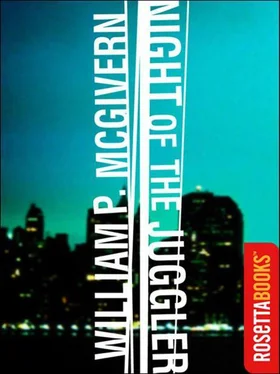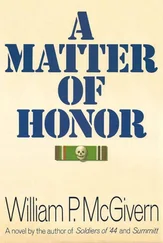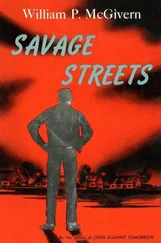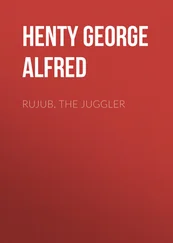William McGivern - Night of the Juggler
Здесь есть возможность читать онлайн «William McGivern - Night of the Juggler» весь текст электронной книги совершенно бесплатно (целиком полную версию без сокращений). В некоторых случаях можно слушать аудио, скачать через торрент в формате fb2 и присутствует краткое содержание. Жанр: Триллер, на английском языке. Описание произведения, (предисловие) а так же отзывы посетителей доступны на портале библиотеки ЛибКат.
- Название:Night of the Juggler
- Автор:
- Жанр:
- Год:неизвестен
- ISBN:нет данных
- Рейтинг книги:3 / 5. Голосов: 1
-
Избранное:Добавить в избранное
- Отзывы:
-
Ваша оценка:
- 60
- 1
- 2
- 3
- 4
- 5
Night of the Juggler: краткое содержание, описание и аннотация
Предлагаем к чтению аннотацию, описание, краткое содержание или предисловие (зависит от того, что написал сам автор книги «Night of the Juggler»). Если вы не нашли необходимую информацию о книге — напишите в комментариях, мы постараемся отыскать её.
Night of the Juggler — читать онлайн бесплатно полную книгу (весь текст) целиком
Ниже представлен текст книги, разбитый по страницам. Система сохранения места последней прочитанной страницы, позволяет с удобством читать онлайн бесплатно книгу «Night of the Juggler», без необходимости каждый раз заново искать на чём Вы остановились. Поставьте закладку, и сможете в любой момент перейти на страницу, на которой закончили чтение.
Интервал:
Закладка:
Chimes sounded from the Delacorte clock. Two thirty. Now the cages were feeding. The clock, on a high arch above the peristyle linking the monkey house with the lion house, was surrounded by a cortege of humorously sculpted animals, all of which “played” a merry musical accompaniment to the clock’s chimes.
As always, Gus Soltik watched with fascination and a sense of awe as the smiling beasts circled the base of the clock, providing a tinkling, bell-like concert for the appreciative audience that had grouped itself in the courtyard between the peristyle and the pond of sea lions. The chubby gray metal animals caught in prancing dance steps filled the air with sweet and innocent music.
The hippo bowed a violin, the kangaroo blew a horn, the bear shook a tambourine while the elephant played an accordion and the goat tinkled his pipes and the penguin pounded a pair of drums.
Lanny. This was where he had met him. The day he had brought the food. Gus liked standing here with the name “Lanny” forming in his mind. There were big people here, too, watching the show. Not just children. That made it all right for him to be here. While he enjoyed the prancing animals and occasionally clapped his big hands together in an attempt to show approval for their antics, the music disturbed him; it was frightening because he didn’t understand it.
Gus went into the animal house where Charlie, the tiger, was feeding and the big lion, Garland, was pacing behind his bars with the regularity of a metronome, obviously having savaged and pulped and devoured his twenty pounds of raw meat, for his eyes were sleepy and there was blood on his whiskers and the floor of the cage.
Gus felt at home with the cages. He liked the smell of the animals, acrid and fetid, and despite the tang of ammonia in the air, the smell was wild and exciting.
Without realizing it in any way at all, Gus Soltik was also given a sense of annealment and strength by the behavior of many of the people in the lion house. They were afraid, and they held their children up to be frightened by the sudden, erratic roaring of the big cats. And for reasons he was forever helpless to define, Gus Soltik took some pathetic comfort from this spectacle.
He stood looking at the big lion called Garland because it was too soon for “greenropes.”
Garland was eight years old, a black-maned African male, a gift to the city of New York from Jomo Kenyatta, President of Kenya. He had been named by the schoolchildren of New York in a contest conducted by the Daily News . The name which had, in fact, topped all others had been Bert Lahr, but this had been disallowed (privately) on the assumption that the children’s votes had been influenced by adults who remembered the great comedian from The Wizard of Oz. The contest officials decided to name the little cat Judy, which they thought would satisfy all age groups, but Jomo’s gift had turned out to be a male, and so they had decided on the lovely but epicene Garland, a name which had not received a single vote in the contest.
He could not tell time, but he could estimate it with reasonable accuracy. And now he knew it was time to look at “greenropes.”
The growling of the lions waiting to be fed had fixed the time for Gus Soltik. Soon, very soon now, he thought, as he hurried toward a place of concealment he had already chosen, thick privet underbrush just behind the wall bordering the eastern side of Central Park at Fifth Avenue in the upper Sixties-soon, he was thinking with a surge of agitation, because he mustn’t be late. The bus would be stopping at the intersection, and she would get off and stand talking to her friend, the winds blowing their green skirts about their white legs, and it was very important that he see her now, because tomorrow was the anniversary of his mother’s death.
Shortly after three o’clock a yellow bus with black trim from Miss Prewitt’s Classes stopped at Fifth Avenue in the upper Sixties of Manhattan. When the front doors opened with a gentle pneumatic hiss, a pair of chattering youngsters climbed down the steps and stood at the intersection waving good-bye to friends, who waved back to them from behind the windows of the bus which was accelerating, heading toward the southern boundaries of Central Park at Fifty-ninth Street.
The names of the two girls were Kate (Katherine Jackson) Boyd and Tish (Patricia) Tennyson, and they were eleven years of age and wore identical uniforms, which consisted of smartly cut black blazers, short green flannel skirts, green berets, white socks, and black moccasins.
The girls lived in adjoining apartment buildings whose drawing-room windows faced the verdant and dramatic views of Central Park.
Kate Boyd had shining blond hair which she wore in a ponytail, secured by a green ribbon, and a pale, unblemished complexion from which her cherry-dark eyes blazed with an almost comical intensity. It was apparent from even a superficial view of these youngsters that the confident excitement and aggressiveness in Kate’s manner completely dominated her friend, Tish Tennyson, whose skin tended to be sallow and whose chubby hips and rounded stomach had scored permanent diagonal creases in her green flannel skirt.
As the crisp gusting winds whipped their hair about their foreheads and cheeks, the two girls hugged their book bags to their chests and chattered at each other with ferocious intensity. Their present preoccupation and stimulation stemmed from a mix of heady ingredients: boys, older boys at that, practically men, and the girls’ shabby betrayal by these adult and arrogant males.
Kate and Tish had scored a coup for their fifth-grade class. They had worked up their nerve to approach Bob Elliott, who was seventeen and the leader of a rock group called The Purple Dreams, with an offer to play the Prewitt School’s “sweet young thing” afternoon tea dance.
To their surprise and delight, Bob Elliott had accepted; The Purple Dreams were cool and “in,” thus an impressive catch indeed for a fifth-grade tea dance. Even though the fee was high, one hundred dollars for a three-hour gig, plus fifteen dollars for the transportation of their electronic gear, Kate Boyd had committed the class funds to the project without reservations, knowing that whatever the price, it was a triumph and worth it.
But this morning their excitement and dreams had collapsed, after Bob Elliott had called to tell them the gig was off because two of The Purple Dreams were down with the flu. This, while wretchedly disappointing, was something they could live with, but at lunch in a pizzeria near Miss Prewitt’s, Kate had learned a bitter, unacceptable truth: Bob Elliott had simply dropped them to play a more prestigious date at Darwin Prep’s senior dinner dance.
Kate Boyd, who was flamingly outraged by any and all degrees of injustice, had cabbed across town to Bob Elliott’s apartment immediately on learning of his betrayal.
“He just laughed at me,” Kate said for about the fifteenth time to Tish.
“Laughed at me. He said we were just kids and wouldn’t understand his music anyway.”
“Did you really say it to him?” Tish said with a thread of excitement in her voice. “What you told me?”
Kate sighed. “No, I didn’t.”
“But you said you said it.”
“Well, I wanted to. I wanted to say, ‘I’d like to kick you’”-Kate lowered her voice theatrically-”’right in your jewels, Bob Elliott.’”
“But you didn’t.”
“Don’t be stupid. I wanted to, it’s the same thing.”
“No, it isn’t, Kate.”
“You don’t even know what it means,” Kate said.
Tish looked anxiously at Kate. She could stand neither Kate’s dismissal nor Kate’s displeasure. “Maybe I don’t,” she said. “Where’d you hear it?”
Читать дальшеИнтервал:
Закладка:
Похожие книги на «Night of the Juggler»
Представляем Вашему вниманию похожие книги на «Night of the Juggler» списком для выбора. Мы отобрали схожую по названию и смыслу литературу в надежде предоставить читателям больше вариантов отыскать новые, интересные, ещё непрочитанные произведения.
Обсуждение, отзывы о книге «Night of the Juggler» и просто собственные мнения читателей. Оставьте ваши комментарии, напишите, что Вы думаете о произведении, его смысле или главных героях. Укажите что конкретно понравилось, а что нет, и почему Вы так считаете.












